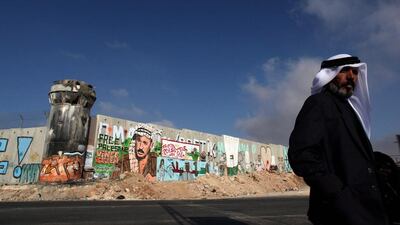Stones were being thrown well before US president Donald Trump arrived in Israel and Palestine last week. They have continued flying after he left for the next stop on his first foreign trip in office. For weeks, Palestinians in the West Bank and Gaza have been protesting at Israeli checkpoints, border zones and inside Palestinian cities, such as Ramallah, in support of more than 1,000 Palestinian prisoners on hunger strike in Israeli jails. Mr Trump’s visit, in fact, was a minor subplot in a larger narrative that has taken shape in Palestine this year.
The hunger strike, which began on April 17, came to an end early on Saturday after Israeli authorities agreed to several conditions laid down by the prisoners. This strike might be over, but its effect will be felt for some time after revealing the endemic fault lines within Palestine.
The Palestinian Authority is facing a crisis of legitimacy that has been exacerbated by its tepid support for the hunger strikers. Palestinians taking to the streets in recent weeks have protested against the occupation along with the PA for its unwillingness to listen to the clear will of its people.
This political impasse is driven by Israel’s long-term project of fragmenting the Palestinians so that they are always in a state of disunity and weakness. The fruits of this project were clear when Hamas announced its revised charter this month that presented a new vision for the conflict.
There are now three competing Palestinian strategies and goals for liberation. Moreover, the West Bank is all but physically severed from the Gaza Strip, where Hamas remains isolated and unable to govern.
Hamas now says it is ready to accept a version of the two-state solution along the 1967 armistice line.
Fatah, under Mahmoud Abbas, has shown its willingness to capitulate to most of Israel’s outlandish demands including the provision that Palestine becomes a demilitarised state and even give up on the right of return for 1948 refugees and their descendants.
Islamic Jihad, the small but influential movement in both the West Bank and Gaza, rejects the premise of negotiations altogether and will continue fighting Israel. With these competing versions of what to do next, how are Palestinians and Israelis expected to make peace according to unknown terms of Mr Trump’s “ultimate deal”?
Internal division and political fragmentation inside Palestine is thus the largest obstacle to any Israeli-Palestinian peace process. The Palestinians have no effective form of leadership that can legitimately speak for them in the West Bank, Gaza and the diaspora. This dire situation did not develop overnight.
It is the result of a carefully thought-out process by Israel and the United States to keep the Palestinians weak and divided.
As Mr Abbas, who is currently in the 12th year of his four-year presidential term, met Mr Trump in Bethlehem last week to discuss the White House’s still unrevealed plan for an Israeli-Palestinian peace agreement, the issue of Palestinian fragmentation wasn’t discussed.
It didn’t need to be. Israel, with the backing of the United States, has invested a considerable amount of money in the PA and Mr Abbas to ensure that West Bank Palestinians don’t organise another campaign of civil disobedience, such as the First Intifada.
The PA, which was set up as an interim self-governing body as part of the 1994 Oslo Accords, has transformed into an effective policing force tasked with cracking down on any form of Palestinian dissent.
Nearly a third of the PA’s annual $4 billion budget reportedly goes to its security services. When Palestinians decide to protest at, say, Israeli settlements in Hebron, they are met with a line of Palestinian security forces preventing them from even getting close to Israeli soldiers or settlers.
With the PA patrolling Palestinians, Israel is free to entrench its matrix of control over the West Bank and shore up its settlements across the territory.
This system has worked so well that this year Israel decided to create an entirely new settlement in the centre of the northern West Bank, something Tel Aviv hasn’t done legally (in the eyes of the Israeli government) for decades.
Regardless of the details of Mr Trump’s ultimate deal for the Israeli-Palestinian conflict, Palestinians are in no position to negotiate a peace agreement. Sure, Mr Abbas could sign a document with Israeli prime minister Benjamin Netanyahu but like Oslo, it will have no staying power nor will it change the power imbalance on the ground.
The recently concluded hunger strike demonstrates that, despite a decades-long campaign by Israel to divide them, Palestinians retain the power to unite behind non-violent protests against Israel’s occupation and its manifestations. That the PA presented itself as a barrier to this campaign is proof that as unity slowly takes root at the grass-roots level, the PA will be a growing target of discontent.
For all the talk of the “ultimate deal”, Mr Trump will probably follow in the footsteps of his predecessor and provide Israel and Mr Abbas with all the help they need to keep Palestinians suppressed, divided and docile.
Mr Trump’s desire to accelerate a peace deal and the possibility of normalisation between Israel and the Arab world will only preserve a status quo in which the Palestinians stay politically weak and fragmented.
The question is how long such a strategy is sustainable, as history warns us that similar attempts at dividing and conquering native populations fell down. When the next intifada comes to Palestine, the PA will probably be its first target and, with no sense of irony, Israel will be quick to argue there’s no unified partner for peace.
jdana@thenational.ae
On Twitter: @ibnezra

